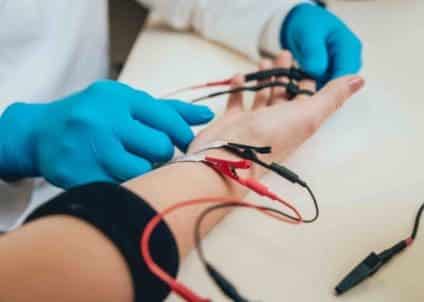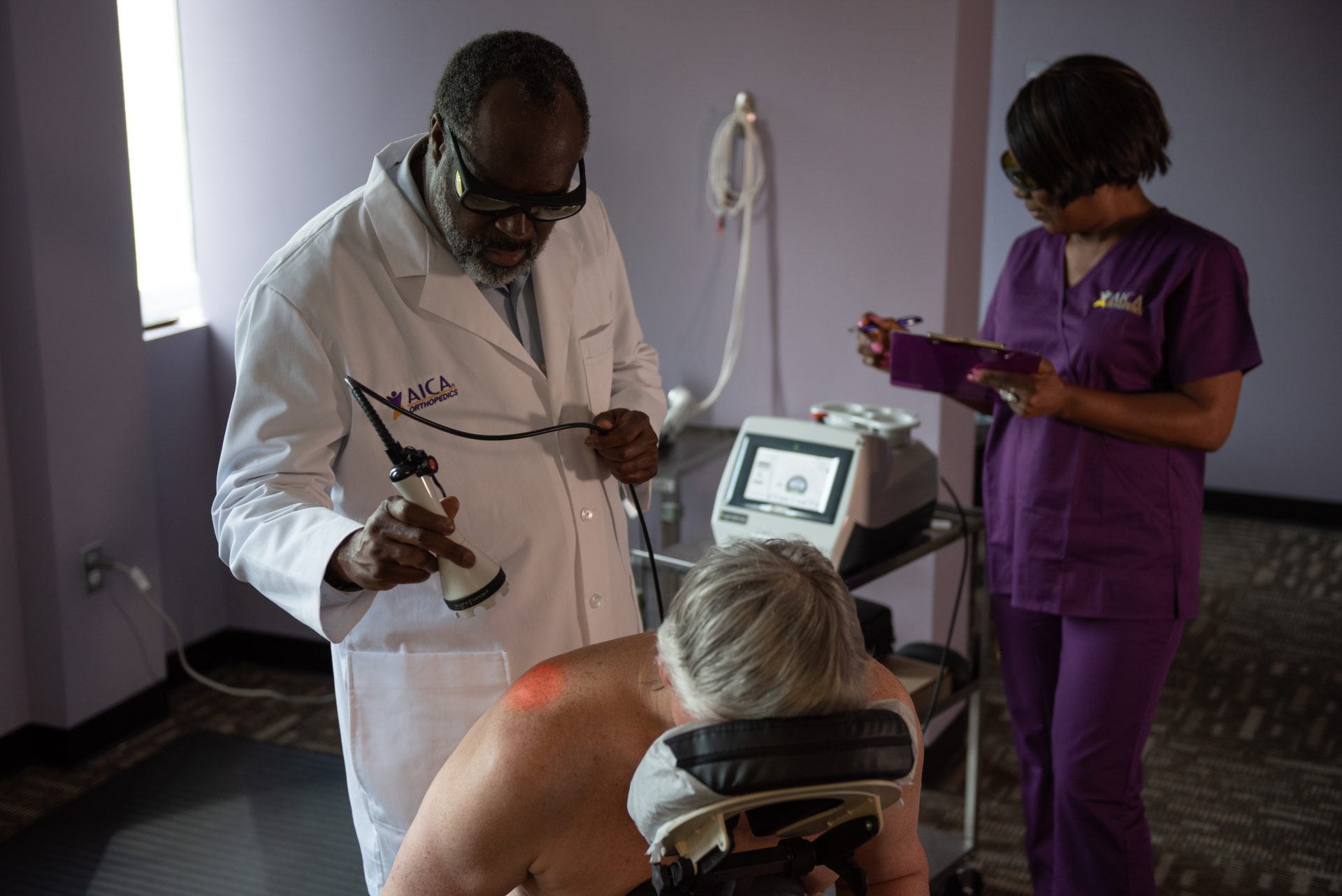Is the EMG Test Right for Me?
 An EMG (electromyogram) may be ordered to see if you have a pinched nerve in the back or the neck. You can usually receive the EMG test and an NCV (Nerve Conduction Velocity) exam during the same visit. Issues with your peripheral nerves and entrapment syndromes are detected with NCV’s, unlike the EMG which detects nerve root pathology coming from the spine and disc herniations. There are multiple reasons why these two exams are needed:
An EMG (electromyogram) may be ordered to see if you have a pinched nerve in the back or the neck. You can usually receive the EMG test and an NCV (Nerve Conduction Velocity) exam during the same visit. Issues with your peripheral nerves and entrapment syndromes are detected with NCV’s, unlike the EMG which detects nerve root pathology coming from the spine and disc herniations. There are multiple reasons why these two exams are needed:
- Locate the origins of the issue
- Determine if the disc herniation has neurological involvement as well
- Determine if all the muscles and nerves are working properly
- Determine if you have any nerve or neurological disorder
These two tests are used in conjunction with each other to determine a more accurate diagnosis. One determines the health of the muscle, and the other determines the health of the nerves. Both of these tests detect serious issues; they also determine different ways to treat and handle each one accordingly.
The Outcome of an EMG Test
While electromyography can be used for other purposes, its primary use is for diagnosing nerve and muscle disturbances. Additionally, if you suspect a particular condition or have been told you have a certain issue, we can explore that specifically and properly diagnose or rule out those things. Based on your muscles’ responses to the electromyography, our specialists can determine the cause of your pain, weakness, tingling, numbness, or cramping. Some of the most common ailments that EMG can detect are as follows:
- Herniated or slipped discs
- Muscle disorders (such as muscular dystrophy)
- Motor problems
- Carpal tunnel syndrome
- Other peripheral nerve disorders
- Motor neuron disorders
- Neuromuscular diseases
- Disruption of communication between nerves and muscles
- Nerve compression or nerve injury
The Right Kind of Specialist
No matter what issue you’re facing with your health and body function, we have the right kind of specialists to diagnose, treat, and care for you. We look at your whole body as a complex structure that works together, rather than separate units that work independently of one another. Your neurological system is a complicated and sophisticated system that coordinates and regulates the activities in the body, and it is one of the first places we look when you’re having a confusing or concerning health issue. Within your nervous system are two sub-systems. The central nervous system is deals with the brain and spinal cord, and the peripheral nervous system deals with the nerves that run to the rest of the body. A neurologist has the expertise to specialize in these areas and is extremely skilled at diagnosing neurological problems. Our neurosurgeons and orthopedic spine surgeons work with our neurologists after the proper diagnosis is determined. The main duties of a neurologist include treating disorders related to the nerves, brain, and spinal cord. Some neurological issues that our specialists may look for include:
- Ridiculopothy
- Severe disc herniatons
- Spinal canal stenosis
- Mylopathy
- Sciatica
- Carpal tunnel
An EMG is performed by our in-house neurologist, who has completed extensive training and certification in EMG testing. In some situations, parts of the test (the nerve conductions) are performed by a nurse or technician. The staff at AICA Orthopedics works hard to make sure you get the most comprehensive care and that you feel comfortable and well-informed during your diagnostic testing and treatment.
Innovative Diagnostic Capabilities
EMG procedures can be incredibly beneficial in helping doctors diagnose a number of issues. The technology is incredibly advanced and here at AICA Orthopedics, our skilled staff is proud to utilize this useful medical technology. Our diagnostic capabilities are expanded a great deal because of electromyography, and we are proud to have helped countless individuals find answers and relief from frustrating health concerns because of this innovative technology. Rest assured that when you enter our facilities, you will be in good hands.
Quick Results for Better Treatment
One of the best things about EMG, aside from its incredible diagnostic capabilities, is the time it takes to complete the procedure and analyze the results. The procedure usually takes less than an hour and a half, if not less time, and our specialists can read, analyze, and interpret the results usually within 30 minutes. This means that you will have answers fast, which also means you can begin treatment sooner. The earlier you begin treatment for a muscle or nerve problem, the quicker you see results and the better your healing is.
If you have muscle discomfort that you want a diagnosis for, get in touch with AICA Orthopedics today. Visit one of our many facilities in and around metro Atlanta. Our specialists are ready to help you get to the bottom of your health concern and get you on the fast road to recovery and pain-free living.













 An EMG (electromyogram) may be ordered to see if you have a pinched nerve in the back or the neck. You can usually receive the EMG test and an NCV (Nerve Conduction Velocity) exam during the same visit. Issues with your peripheral nerves and entrapment syndromes are detected with NCV’s, unlike the EMG which detects nerve root pathology coming from the spine and disc herniations. There are multiple reasons why these two exams are needed:
An EMG (electromyogram) may be ordered to see if you have a pinched nerve in the back or the neck. You can usually receive the EMG test and an NCV (Nerve Conduction Velocity) exam during the same visit. Issues with your peripheral nerves and entrapment syndromes are detected with NCV’s, unlike the EMG which detects nerve root pathology coming from the spine and disc herniations. There are multiple reasons why these two exams are needed:








